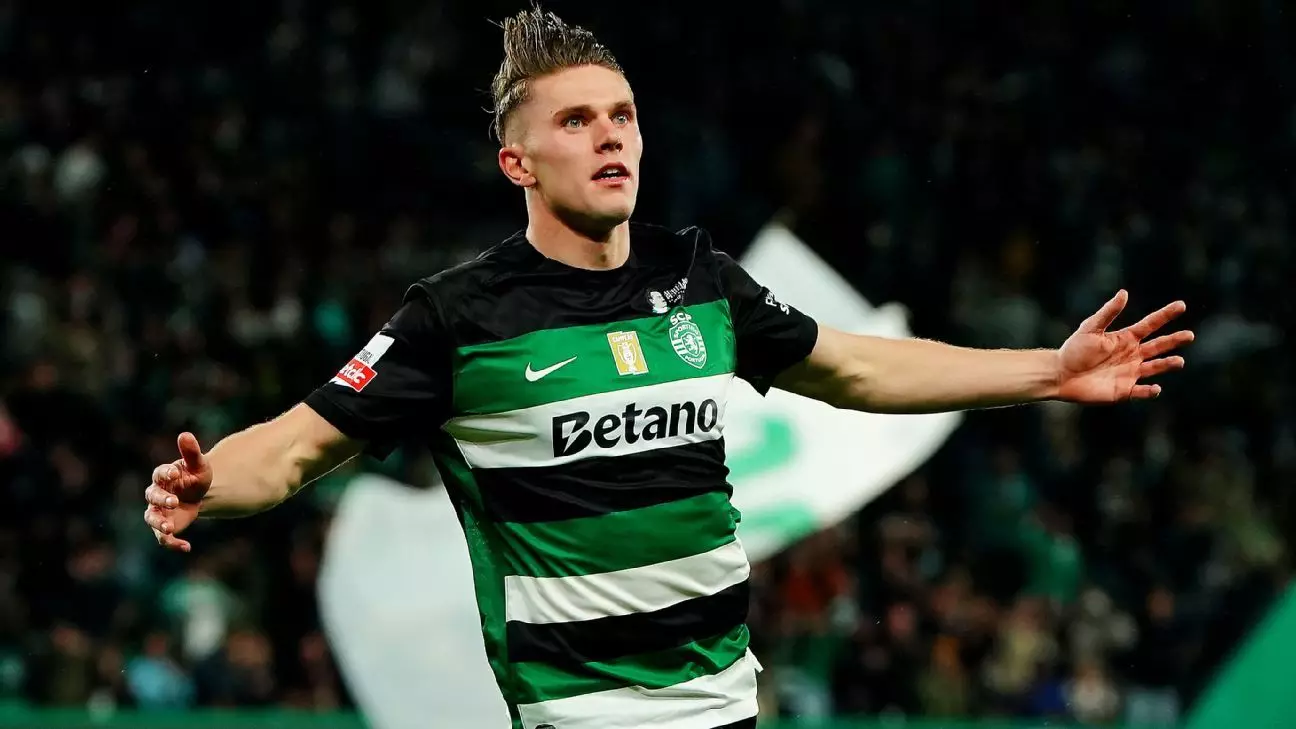In contemporary football, the transfer window has transformed into a high-stakes arena where clubs showcase their ambition, strategic planning, and sometimes, reckless pursuit of glory. The recent flurry of activity, from Arsenal’s aggressive pursuit of Viktor Gyökeres to Manchester United’s scramble for Dominic Calvert-Lewin, exemplifies an industry driven by relentless competition. It’s a spectacle of ambition, but beneath the surface, it exposes uncomfortable truths about sportsmanship, patience, and the true meaning of team-building.
Clubs are increasingly impatient, refusing to wait for the ideal moment or the perfect candidate. Arsenal’s apparent willingness to contemplate a strike from Gyökeres underscores a troubling readiness to bypass dialogue for swift results. This approach raises questions about respect for players’ aspirations and the ethics of using threats as bargaining chips. Such tactics might accelerate deals in the short term but risk tarnishing club reputations and damaging player-club relationships in the long run. In the grand scheme of sporting integrity, rushing transfers without due diligence undermines the essence of fair play.
Furthermore, the relentless chase for marquee signings often leads clubs into financial overreach. Arsenal’s willingness to shell out €70 million plus bonuses for Gyökeres indicates a mindset driven more by the adrenaline of capturing headlines than strategic growth. These astronomical sums not only inflate market values but also distort the financial balance within leagues, often to the detriment of smaller clubs and overall competitive sustainability. The frenzy sometimes sacrifices the nuanced art of building cohesive teams over acquiring individual talents, thus risking a short-lived spike in performance without foundational stability.
Star Power and the Illusion of Instant Success
The pursuit of high-profile players like Rashford, Madueke, or Osimhen exemplifies a recurring narrative in football: the obsession with star power as a shortcut to trophies. While this approach can provide instant excitement, it often neglects the importance of strategic team integration and youth development. Manchester United’s interest in Dominic Calvert-Lewin, a player who has been frequently plagued by injuries, reveals a gamble rooted in name recognition rather than consistent form or long-term planning.
Additionally, clubs like Barcelona and PSG are constantly reevaluating their target lists, seeking bargain deals and undervalued assets. The apparent shift away from Dumfries or a sudden interest in Bissouma or Ndoye signifies a broader trend of pivoting based on availability rather than genuine need. This constant juggling exposes a lack of cohesive football philosophy, where transfer diplomacy is driven by market whims and short-term patchwork rather than a clear vision.
Yet, this transient approach can backfire by undermining the development of homegrown players or fostering team chemistry. Arsenal’s hesitant negotiations with Nwaneri, despite his potential, and Chelsea’s interest in Madueke—projected to cost over £50 million—highlight how clubs are sometimes more eager to chase headlines than invest in sustainability. The danger lies in prioritizing immediate results over cultivating a balanced squad, risking future instability once the glitter of star signings fades.
The Hidden Costs of Transfer Frenzies
Beyond the immediate financial implications, aggressive transfer pursuits have wider cultural and strategic consequences. The decision to reject or delay negotiations impacts club morale, fan perception, and player loyalty. For instance, Wrexham’s record-breaking £5 million deal for Lewis O’Brien demonstrates ambition but also underscores the disparities in financial clout within the lower tiers of football. The struggle to meet salary expectations for such deals showcases how even ambitious clubs can face sustainability issues.
Meanwhile, the myth of the “instant upgrade” is often challenged by the reality of integration issues. Angel Correa’s potential departure from Atlético Madrid and the multiple players linked with big-money moves—like Rashford, Ndoye, or Baddiel—highlight that not every transfer results in harmony. Sometimes, high expectations can rack up pressure on new signings, leading to underperformance or fractured team dynamics.
Moreover, the frequent rumors and changing targets reflect insecurity within clubs—an unwillingness to commit or a lack of clear direction. Juventus and Napoli’s ongoing negotiations over players like Bissouma or Ndoye mirror the broader gaming of the transfer market, where decisions are often driven by strategic manipulations rather than genuine need or tactical fit. This atmosphere fosters a culture where players become commodities and negotiations become power plays, eroding the core values of competition rooted in skill, effort, and loyalty.
The Future of Transfer Strategies: Embracing Stability over Spontaneity
While the current transfer climate appears chaotic and driven by fleeting market trends, the most forward-thinking clubs recognize the value of patience, planning, and sustainable growth. Instead of chasing every big name, investing in youth, developing talent, and fostering club cohesion can offer more lasting success. The emphasis should shift from impulsive spending to strategic understanding of team needs and long-term vision.
In the end, football’s evolution must balance ambition with integrity. Sky-high transfer fees and relentless negotiations threaten the sport’s soul, but they also present an opportunity for clubs to redefine what success truly means. Genuine progress lies in building resilient teams rooted in tactical discipline, nurturing homegrown talents, and fostering a culture that values patience over impulsiveness.
The modern game could benefit from a reassessment of priorities, where the power of strategic, well-timed moves outweighs the fleeting allure of blockbuster signings. Only then can clubs truly harness the power of transfer dealings not as mere financial transactions, but as catalysts for sustainable excellence and true sporting greatness.

